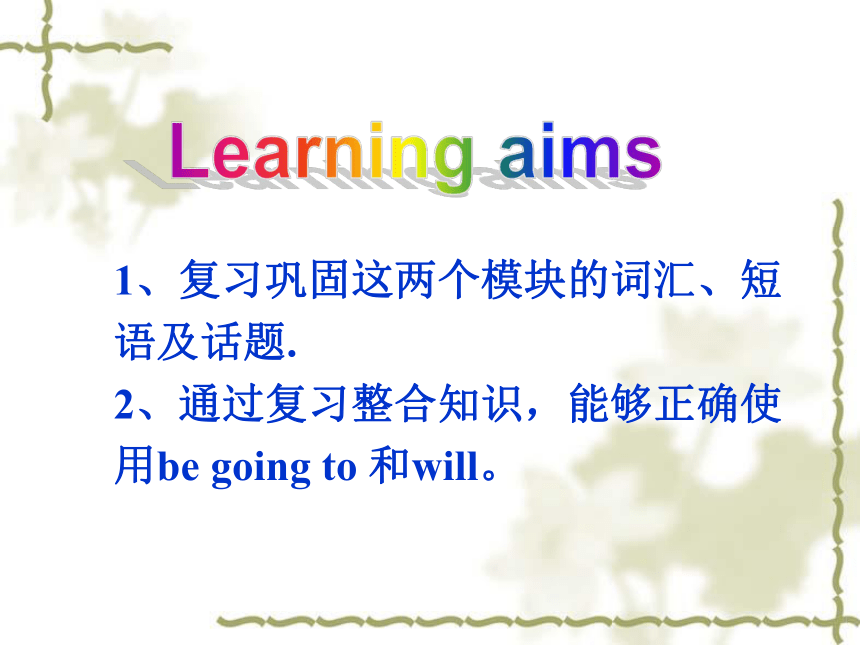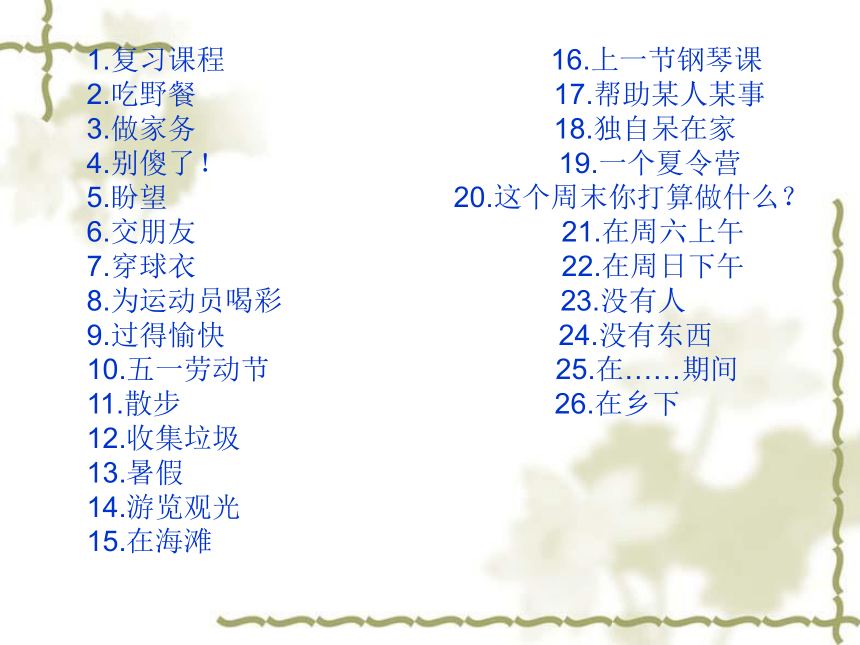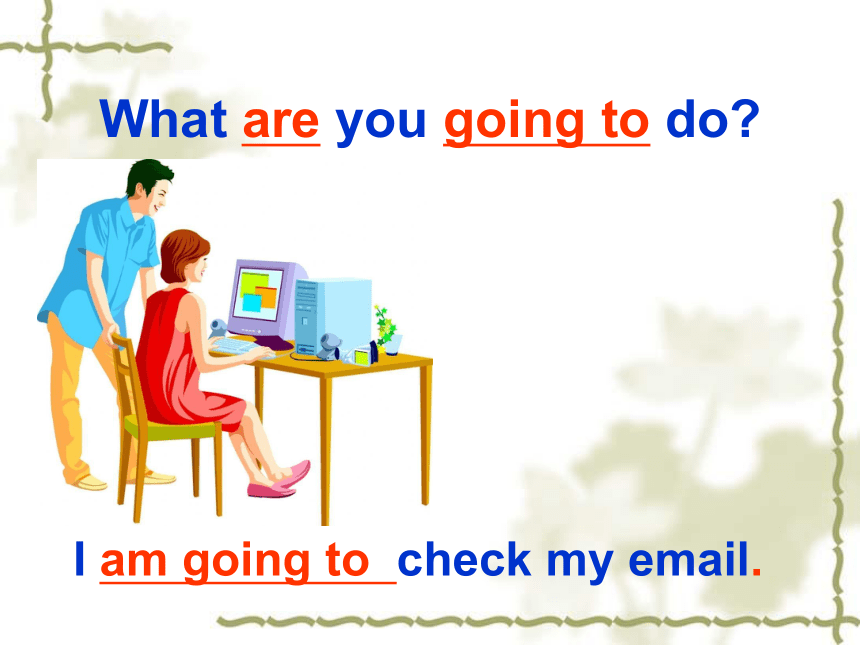Module 3 Unit 3 Language in use 课件(共27张PPT)
文档属性
| 名称 | Module 3 Unit 3 Language in use 课件(共27张PPT) |  | |
| 格式 | ppt | ||
| 文件大小 | 1.7MB | ||
| 资源类型 | 教案 | ||
| 版本资源 | 外研版 | ||
| 科目 | 英语 | ||
| 更新时间 | 2022-05-29 18:56:19 | ||
图片预览









文档简介
(共27张PPT)
Module 3
Making plans
Module 4
Life in the future
1、复习巩固这两个模块的词汇、短语及话题.
2、通过复习整合知识,能够正确使用be going to 和will。
3.情感态度目标
4、教学重点、难点
M 3 Making plans
2.语言技能目标
1.语言知识
目标
单元目标分析
单词:picnic,housework,nobody,nothing,silly,fantastic,cheer,player,win,during,late,
country, collect, litter, camp,beach,early.
词组:have a picnic,do housework,look forward to, make friends,enjoy oneself,take a walk,go sightseeing,…
能听懂、读懂包含计划、安排的对话,并且判断出对话中人物的计划。能用be going to表达自己的计划、安排,并能询问对方的计划
养成良好的、有计划的生活和学习习惯,培养自主学习的能力。
.教学难点
能够把旧知识迁移到实际生活中来,结合事例用be going to表达。
.教学重点:
单词,词组 ,be going to用法
3.情感态度目标
4、教学重点、难点
M 4Life in the future
2.语言技能目标
1.语言知识
目标
单元目标分析
单词:chalk,ruler,carry,change, everything,future,need,question,level,free,machine,space,traffic,cheap,heavy…
词组:in the future,be able to, not … any more, traffic jam, come true, here is/are,…
能听懂、读懂谈论未来的对话,并且判断未来事实。能用will表达自己对未来的想象
通过对美好未来的憧憬,培养乐观向上的精神。
.教学难点
能够把旧知识迁移到实际生活中来,结合事例用will表达。
.教学重点:
单词,词组 ,will用法
Review the words and sentences that we have studied in these modules.
1.复习课程 16.上一节钢琴课
2.吃野餐 17.帮助某人某事
3.做家务 18.独自呆在家
4.别傻了! 19.一个夏令营
5.盼望 20.这个周末你打算做什么?
6.交朋友 21.在周六上午
7.穿球衣 22.在周日下午
8.为运动员喝彩 23.没有人
9.过得愉快 24.没有东西
10.五一劳动节 25.在……期间
11.散步 26.在乡下
12.收集垃圾
13.暑假
14.游览观光
15.在海滩
What are you going to do
at the weekend
I am going to have a piano lesson.
What are you going to do
I am going to check my email.
What are they going to do
They are going to play basketball.
What is she going to do
She is going to swim.
一、be going to 的用法点拨
be going to 是一种固定结构,它后面要接动词原形,用来表示按计划或安排要发生的动作,有时也可以表示推测将要或肯定会发生的动作,有“准备;打算”的意思。含有be going to 结构的句子中往往有表示将来的时间状语。例如:
We are going to see a movie this afternoon. 今天下午我们打算去看电影。
Look at the black clouds. It’s going to rain.看那些乌云,快要下雨了。
二、be going to 在肯定句中的形式
be going to 结构中的助动词be很少用原形,它一般有三种形式,即:am, is, are。当主语是 I 时用am ;当主语是第三人称单数时用is;当主语是其他人称时用are。例如:
I am going to buy something tomorrow.
She is going to see me this afternoon.
三、含be going to 的句子变否定句和一般疑问句的变法由于句子中有助动词be,即在be (am, is, are) 的后面加上not 就构成了否定句;把be (am, is, are) 放到句首,在句末加问号就构成了一般疑问句,其答语为:Yes, 主语+ am/is/are. / No, 主语+ isn’t/aren’t. / No, I’m not. 例如:
They are going to have a picnic this Sunday. (肯定句)
They are not going to have a picnic this Sunday. (否定句)
—Are they going to have a picnic this
Sunday
—Yes, they are. (No, they aren't.)
(一般疑问句及其回答)
四、使用be going to 应注意的两点:
1.There be 句型的be going to 结构为:There is / are going to be... (注意句型中going to 后面的be不能改为have。) 常用来表示将有某事发生。例如:
There is going to be a football match next Saturday in our school.
下周六我们学校将有一场足球比赛。
2. come, go, leave, arrive等表示位置移动的动词常用现在进行时表示将要发生的动作,它们很少与be going to 结构连用。例如:
Miss Sun is coming tonight.
今晚孙小姐要来。
1. There ____ a meeting tomorrow afternoon.
A. will be going to B. will going to be
C. is going to be D. will go to be
2. Charlie ________ here next month.
A. isn’t working B. doesn’t working
C. isn’t going to working D. won’t work
He _____ very busy this week, he ______
free next week.
A. will be; is B. is; is
C. will be; will be D. is; will be
单项选择
4. I’m ____ to Australia.
A. go B. goes
C. will go D. going
5. – ___ you ________ free tomorrow
– No. I ______ free the day after tomorrow.
A. Are; going to; will
B. Are; going to be; will
C. Are; going to; will be
D. Are; going to be; will be
Talk about your plans for the weekend using “I will/won’t…”.
On Saturday, I will …
Will you … on Saturday
Yes, I will.
No, I won’t.
On Saturday, I won’t …
一般将来时
如果我们想描述将来的事情或表达对未来的预测等,我们可以用一般将来时表达,它的动词形式是:“will + 动词原形”。例如:
There will be a computer on every desk in the future. 未来每个桌子上都将有一台电脑。
It will rain tomorrow. 明天将要下雨。
We will go to school on foot.
我们将步行去上学。
语法透析
一般将来时的一般疑问形式
及其肯定、否定回答:
这个时态的一般疑问形式,是将 will 提到句首,并在句尾使用问号。肯定回答用 will,否定回答用缩略式 won’t。例如:
Will there be a computer on every desk tomorrow Yes, there will. / No, there won’t.
未来每个桌子上都将有一台电脑吗? 是的,将有。 / 不,将没有。
一般将来时的一般疑问形式
及其肯定、否定回答:
Will it rain tomorrow
Yes, it will. / No, it won’t.
明天将会下雨吗?是的, 将会。 / 不, 将不会。
Will we go to school by bus tomorrow
Yes, it will. / No, it won’t.
明天我们将乘公交车去上学吗?
是的,将会。 / 不,将不会。
( )1. ________ you ________ free next
Sunday
A. Will; are B. Will; be
C. Do; be D. Are; be
一、选择题。
( ) 2. There __________ a meeting
tomorrow afternoon.
A. will be going to B. will going to be
C. is going to be D. will go to be
( ) 3. Charlie ________ here next
month.
A. isn’t working B. doesn’t working
C. isn’t going to working
D. won’t work
( ) 4. He ________ very busy this week,
he ________ free next week.
A. will be; is B. is; is
C. will be; will be D. is; will be
( ) 5. There ________ a dolphin show in
the zoo tomorrow evening.
A. was B. is going to have
C. will have D. is going to be
Module 3
Making plans
Module 4
Life in the future
1、复习巩固这两个模块的词汇、短语及话题.
2、通过复习整合知识,能够正确使用be going to 和will。
3.情感态度目标
4、教学重点、难点
M 3 Making plans
2.语言技能目标
1.语言知识
目标
单元目标分析
单词:picnic,housework,nobody,nothing,silly,fantastic,cheer,player,win,during,late,
country, collect, litter, camp,beach,early.
词组:have a picnic,do housework,look forward to, make friends,enjoy oneself,take a walk,go sightseeing,…
能听懂、读懂包含计划、安排的对话,并且判断出对话中人物的计划。能用be going to表达自己的计划、安排,并能询问对方的计划
养成良好的、有计划的生活和学习习惯,培养自主学习的能力。
.教学难点
能够把旧知识迁移到实际生活中来,结合事例用be going to表达。
.教学重点:
单词,词组 ,be going to用法
3.情感态度目标
4、教学重点、难点
M 4Life in the future
2.语言技能目标
1.语言知识
目标
单元目标分析
单词:chalk,ruler,carry,change, everything,future,need,question,level,free,machine,space,traffic,cheap,heavy…
词组:in the future,be able to, not … any more, traffic jam, come true, here is/are,…
能听懂、读懂谈论未来的对话,并且判断未来事实。能用will表达自己对未来的想象
通过对美好未来的憧憬,培养乐观向上的精神。
.教学难点
能够把旧知识迁移到实际生活中来,结合事例用will表达。
.教学重点:
单词,词组 ,will用法
Review the words and sentences that we have studied in these modules.
1.复习课程 16.上一节钢琴课
2.吃野餐 17.帮助某人某事
3.做家务 18.独自呆在家
4.别傻了! 19.一个夏令营
5.盼望 20.这个周末你打算做什么?
6.交朋友 21.在周六上午
7.穿球衣 22.在周日下午
8.为运动员喝彩 23.没有人
9.过得愉快 24.没有东西
10.五一劳动节 25.在……期间
11.散步 26.在乡下
12.收集垃圾
13.暑假
14.游览观光
15.在海滩
What are you going to do
at the weekend
I am going to have a piano lesson.
What are you going to do
I am going to check my email.
What are they going to do
They are going to play basketball.
What is she going to do
She is going to swim.
一、be going to 的用法点拨
be going to 是一种固定结构,它后面要接动词原形,用来表示按计划或安排要发生的动作,有时也可以表示推测将要或肯定会发生的动作,有“准备;打算”的意思。含有be going to 结构的句子中往往有表示将来的时间状语。例如:
We are going to see a movie this afternoon. 今天下午我们打算去看电影。
Look at the black clouds. It’s going to rain.看那些乌云,快要下雨了。
二、be going to 在肯定句中的形式
be going to 结构中的助动词be很少用原形,它一般有三种形式,即:am, is, are。当主语是 I 时用am ;当主语是第三人称单数时用is;当主语是其他人称时用are。例如:
I am going to buy something tomorrow.
She is going to see me this afternoon.
三、含be going to 的句子变否定句和一般疑问句的变法由于句子中有助动词be,即在be (am, is, are) 的后面加上not 就构成了否定句;把be (am, is, are) 放到句首,在句末加问号就构成了一般疑问句,其答语为:Yes, 主语+ am/is/are. / No, 主语+ isn’t/aren’t. / No, I’m not. 例如:
They are going to have a picnic this Sunday. (肯定句)
They are not going to have a picnic this Sunday. (否定句)
—Are they going to have a picnic this
Sunday
—Yes, they are. (No, they aren't.)
(一般疑问句及其回答)
四、使用be going to 应注意的两点:
1.There be 句型的be going to 结构为:There is / are going to be... (注意句型中going to 后面的be不能改为have。) 常用来表示将有某事发生。例如:
There is going to be a football match next Saturday in our school.
下周六我们学校将有一场足球比赛。
2. come, go, leave, arrive等表示位置移动的动词常用现在进行时表示将要发生的动作,它们很少与be going to 结构连用。例如:
Miss Sun is coming tonight.
今晚孙小姐要来。
1. There ____ a meeting tomorrow afternoon.
A. will be going to B. will going to be
C. is going to be D. will go to be
2. Charlie ________ here next month.
A. isn’t working B. doesn’t working
C. isn’t going to working D. won’t work
He _____ very busy this week, he ______
free next week.
A. will be; is B. is; is
C. will be; will be D. is; will be
单项选择
4. I’m ____ to Australia.
A. go B. goes
C. will go D. going
5. – ___ you ________ free tomorrow
– No. I ______ free the day after tomorrow.
A. Are; going to; will
B. Are; going to be; will
C. Are; going to; will be
D. Are; going to be; will be
Talk about your plans for the weekend using “I will/won’t…”.
On Saturday, I will …
Will you … on Saturday
Yes, I will.
No, I won’t.
On Saturday, I won’t …
一般将来时
如果我们想描述将来的事情或表达对未来的预测等,我们可以用一般将来时表达,它的动词形式是:“will + 动词原形”。例如:
There will be a computer on every desk in the future. 未来每个桌子上都将有一台电脑。
It will rain tomorrow. 明天将要下雨。
We will go to school on foot.
我们将步行去上学。
语法透析
一般将来时的一般疑问形式
及其肯定、否定回答:
这个时态的一般疑问形式,是将 will 提到句首,并在句尾使用问号。肯定回答用 will,否定回答用缩略式 won’t。例如:
Will there be a computer on every desk tomorrow Yes, there will. / No, there won’t.
未来每个桌子上都将有一台电脑吗? 是的,将有。 / 不,将没有。
一般将来时的一般疑问形式
及其肯定、否定回答:
Will it rain tomorrow
Yes, it will. / No, it won’t.
明天将会下雨吗?是的, 将会。 / 不, 将不会。
Will we go to school by bus tomorrow
Yes, it will. / No, it won’t.
明天我们将乘公交车去上学吗?
是的,将会。 / 不,将不会。
( )1. ________ you ________ free next
Sunday
A. Will; are B. Will; be
C. Do; be D. Are; be
一、选择题。
( ) 2. There __________ a meeting
tomorrow afternoon.
A. will be going to B. will going to be
C. is going to be D. will go to be
( ) 3. Charlie ________ here next
month.
A. isn’t working B. doesn’t working
C. isn’t going to working
D. won’t work
( ) 4. He ________ very busy this week,
he ________ free next week.
A. will be; is B. is; is
C. will be; will be D. is; will be
( ) 5. There ________ a dolphin show in
the zoo tomorrow evening.
A. was B. is going to have
C. will have D. is going to be
同课章节目录
- Module 1 Lost and found
- Unit 1 Whose bag is this?
- Unit 2 Are they yours?
- Unit 3 Language in use
- Module 2 What can you do ?
- Unit 1 I can play the piano
- Unit 2 I can run really fast
- Unit 3 Language in use
- Module 3 Making plans
- Unit 1 What are you going to do at the weekends?
- Unit 2 We're going to cheer the players.
- Unit 3 Language in use
- Module 4 Life in the future
- Unit 1 Everyone will study at home
- Unit 2 Every family will have a small plane.
- Unit 3 Language in use
- Module 5 Shopping
- Unit 1 What can I do for you?
- Unit 2 You can buy everything on the Internet
- Unit 3 Language in use
- Module 6 Around town
- Unit 1 Could you tell me how to get to the Nationa
- Unit 2 The London Eye is on your right.
- Unit 3 Language in use
- Revision module A
- Module 7 My past life
- Unit 1 I was born in a small village.
- Unit 2 I was born in Quincy.
- Unit 3 Language in use
- Module 8 Story time
- Unit 1 Once upon a time….
- Unit 2 Goldilocks hurried out of the house.
- Unit 3 Language in use
- Module 9 Life history
- Unit 1 He left school and began work at the age of
- Unit 2 He decided to be an actor.
- Unit 3 Language in use
- Module 10 A holiday journey
- Unit 1 What did you do?
- Unit 2 This morning we took a walk.
- Unit 3 Language in use
- Module 11 Body language
- Unit 1 They touch noses!
- Unit 2 Here are some ways to welcome them.
- Unit 3 Language in use
- Module 12 Western music
- Unit 1 It's so beautiful!
- Unit 2 Vienna is the centre of European classical
- Unit 3 Language in use
- Revision module B
